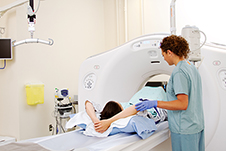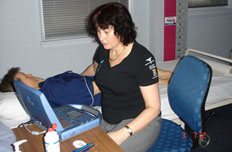CANTATA Study
CANTATA is a new study to develop tests to detect antibodies in the body produced in response to exposure to the COVID-19 virus.
CRITICAL-ACS: Using CT to reduce invasive coronary angiograms in heart attacks
 This study is testing the ability of non-invasive CT scans to reduce the need for traditional coronary angiograms ('catheter tests') to look at the heart arteries of people with a suspected heart attack.
This study is testing the ability of non-invasive CT scans to reduce the need for traditional coronary angiograms ('catheter tests') to look at the heart arteries of people with a suspected heart attack.
Both tests are safe and effective ways to look at the heart arteries and there are advantages and disadvantages to both. Traditional coronary angiograms allow blocked arteries to be opened and treated with 'stents' during a single procedure but can cause some discomfort as a tube ('catheter') needs to be threaded up from the risk or groin to reach the heart. CT scans are less invasive and provide similar information to catheter-based angiograms. For about 1 in 3 patients this would be the only test required but if blockages are found, patients would require the traditional coronary angiogram to allow these to be treated. Importantly, whilst CT scans are available at nearly all NZ hospitals treating heart attacks, coronary angiograms can only be performed at the larger centres so many patients need to be transferred between hospitals for this.
Participants involved in this study will have been identified when their treating doctor suspects they have had a heart attack and wants to look at the heart arteries to confirm this. After consenting to participate in the study, patients will be randomly allocated to undergo either the CT scan or the traditional coronary angiogram as the first test. Every participant will continue to receive all the usual treatments for their heart and if the CT scan identifies problems that may need treatment these patients will still need to undergo the catheter-based test. We expect to reduce the need for the more invasive procedure by about one third.

For more information about the study, please watch this short animation:
For further information, you can speak with a Research Nurse:
Tel +64 3 364 1063
Txt +64 21 0836 7936
Pontiac II: Type 2 diabetes heart risk study
Volunteers with type 2 diabetes wanted for heart disease risk study.
 Are you a person with type 2 diabetes aged between 18 and 65 years?
Are you a person with type 2 diabetes aged between 18 and 65 years?
If you have no evidence of a pre-existing heart disease, we invite you to take part in this study. The trial will evaluate the effect of high dose treatment using blood pressure medication, to prevent cardiac events in people with type 2 diabetes mellitus (T2DM).
Men and women who have had T2DM for at least six months can participate in this trial which involves four visits over 24 months and a long-term follow-up by phone.
People with T2DM have an increased risk of developing heart disease. This risk is not the same for all people with diabetes. For optimal treatment, it is necessary to distinguish between people with a low or a high risk of heart disease. The distinction can be made using a blood test to measure the level of a hormone produced by the heart called NT-proBNP.
The NT-proBNP blood test in an earlier version of this study (PONTIAC I) was able to identify diabetics who are at high risk of heart disease. High doses of specific blood pressure drugs may reduce the risk of serious heart disease by more than half. Evidence from other research studies show that about 40 percent of diabetics without heart disease could significantly benefit from this therapy.
In this clinical study, we will investigate people with type 2 diabetes without previous heart disease, to assess whether consistent treatment with blood-pressure-lowering drugs benefits high-risk patients and those with a lower risk. A total of 2,400 people will be enrolled in this study from hospitals in Europe and Christchurch. We aim to enrol up to 200 patients from Christchurch.
To find out more about this trial, please contact
Cindy Kim
Christchurch Heart Institute
Tel +64 3 378 6137
Email cindy.kim@cdhb.health.nz
Hauora Manawa/Heart Health: The Community Heart Study
There is a major disparity between Māori and non-Māori in cardiovascular mortality.
Few studies exist on the prevalence and incidence of cardiovascular disease in the Māori community. Our research aims to collect information on:
- Current levels of established heart disease
- Previously undiagnosed diabetes
- Cardiovascular disease and their risk factors in randomly-selected population samples
The samples groups are:
- Ngāti Kahungunu ki Wairoa in Hawkes Bay
- Mana Whenua ki Waitaha in Canterbury
- A non-Maori control group in Canterbury
Find out more about the Hauora Manawa/Heart Health: The Community Heart Study
Christchurch Family Heart Study
This study researches genes that may be associated with cardiovascular disease. It compares the genes of those people with and without heart disease.
Cardiovascular disease accounts for approximately 40% of all deaths per year. This compares to 26% for cancer. The most common forms of cardiovascular disease include:
- Angina
- Heart attack (myocardial infarction)
- Heart failure
The death rate from cardiovascular disease is more than twice as high in men as in women. Diseases of the heart and blood vessels are the leading cause of death in New Zealand
For those over 65 years of age, 84% of deaths are related to cardiovascular disease.
Learn more about the Christchurch Family Heart Study and how you can help.
Healthy Volunteers for the study of heart disease
We are researching the genes that may be associated with cardiovascular disease, by comparing the pattern of genes from people without heart disease with patients who have heart disease.
What is a Healthy Volunteer?

Research volunteer having an echocardiogram
A Healthy Volunteer is a person with no prior diagnosis of:
- Stroke
- Angina
- Coronary artery disease
- Heart failure
- Heart attack or myocardial infarction
- Any other cardiac problems
The Healthy Volunteer will be:
- part of a group of over 3000 heart-healthy people
- randomly recruited from the Canterbury electoral rolls, and age- and gender-matched to our heart patient study group
- asked to donate a blood and urine samples
- asked to answer a short questionnaire detailing your relevant personal medical history and your family history of heart disease and related conditions
For more information contact Judith Thomson at judith.thomson@cdhb.health.nz or on 03 364 1647
CNP – what role does it play in combatting Arteriosclerosis?
We are studying a hormone called CNP, or C-type Natriuretic Peptide and the role it may play in combatting the hardening of the arteries.
Learn more about the CNP's, the role they play and how you can help.

